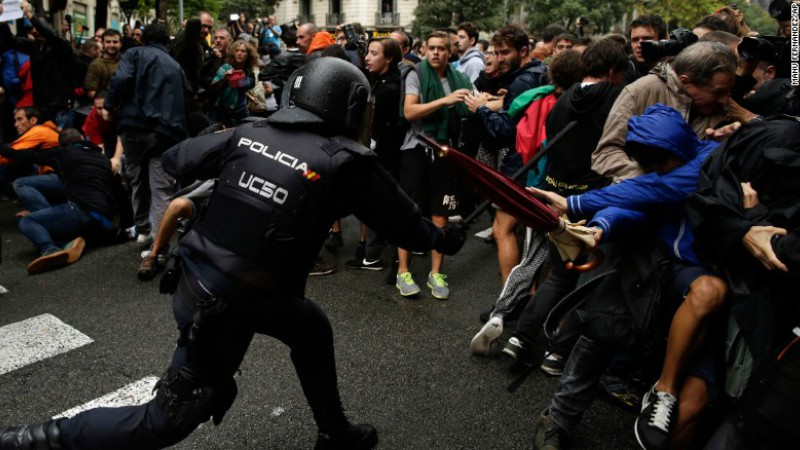Catalan Referendum: The Consequences of Poor Governance

Thousands of Catalans took to the streets of Barcelona and gathered at the city’s National Police headquarters on Monday in protest of the Police Violence witnessed earlier this week. The Catalans demanded independence and asked the police force to leave their region. Many pro-independence workers throughout the city organised the strike causing Schools, Colleges and Businesses to stay closed on Tuesday.
The Catalan Department of Health tweeted earlier on Monday that 893 people that required medical assistance because of the Police beatings were treated by the doctors of the Catalan Health System. Several pictures and videos of Policemen thrashing citizens with batons went viral on social media platforms.
The physical wounds may have been treated, but the protest signifies that Catalans are angry by the actions of the Spanish Government and have opposed by forcing the policemen out of hotels in the region with protests reported in towns like Calella, Lleida, Reus and Pineda de Mar.
David Coll, the owner of a 3-star hotel in the town of Calella asked the policemen sleeping in his hotel to leave. It is reported that he received threats from the Catalan Protesters. They reminded him of his young kids and claimed that they would burn down his hotel. The protesters also pressurised distributors to cut supplies to all hotels in the region that allow Policemen to stay.
Meanwhile, Protests and Roadblocks caused traffic jams across several areas of Barcelona, while public transportation systems were also affected severely. Trade Unions participated in the strike while the Port of Barcelona ceased operations for the day. The Catalan Government assured workers that their wages would not be blocked even if they chose to participate in the protest. famous tourist spots were also closed.
How the Catalan Referendum was organised:
The Catalan Referendum bill which allowed the voting to take place on Sunday was passed by the regional parliament on 6th September this year, however, the bill was declared ‘illegal’ by the Spanish Government immediately as normal parliamentary procedures were disregarded. At the time of voting, 52 parliament ministers had already walked out in protest leaving behind a majority of pro-independence ministers that voted in favour of the referendum winning by a thin margin.
As planned, the Catalan Government led by Carles Puigdemont remained adamant amidst constant disapproval by the National Parliament and conducted the referendum on Sunday which saw Catalans queuing up at voting centres from as early as 5am.
How the Spanish Government reacted:
In response, the Spanish Government had deployed 10,000 police personnel in the region to halt the ‘illegal’ referendum which eventually led to clashes between Catalans and the National Police. The police were instructed to confiscate ballot papers, block and restrict voters from entering voting centres, seize ballot boxes, disrupt communication and electronic voting systems and they did, but more than 850 people were left wounded in the process, including men, women and elder citizens who stood their ground to make their vote count.
On Monday, Puigdemont’s government claimed that 90% of the 2.26 million votes received were in favour of independence and these results would be passed on in the regional parliament so that the state can successfully transform itself in accordance with the law. From a total of 5.6 million Registered Catalan Voters only 2.26 Million votes were received by the Authorities.
What will happen in Catalonia now:
Uncertainty about the region persists as no arrangement has been made between the Catalan and the Spanish Government yet and both sides are fixated on their decisions. The European Union has declared the issue as an ‘internal matter’ and declined to intervene. Independence for Catalan may or may not come at the end of this political war, but the consequences of it will affect only the general public of Catalonia.





